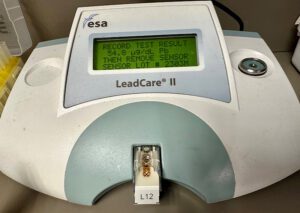Have You Heard About Lead Toxicity?
Exposure to lead and other heavy metals can affect many body systems in humans and nonhuman animals. Signs of exposure may include lack of coordination, dizziness, weight loss, regurgitation, and diarrhea. If left untreated, heavy metal toxicity can progress to anemia, and even death.
Some building materials, especially those found in older homes, may contain lead. Exotic pets can be exposed by chewing on floors, baseboards, and walls, or on other surfaces or objects that contain lead such as weights, galvanized wire, or hardware. We often see cases of lead or zinc toxicity in birds, but it can be found in any species. To protect your exotic pet, always provide supervision while they are outside free roaming. Be sure to provide them with a pet-proofed play area that is free of potential toxins, human health supplements, and metallic objects. Make a habit of monitoring and recording any changes in your pet’s appetite, weight, and energy level so you can spot problems early.


We, at The Veterinary Center for Birds and Exotics, are well equipped to handle cases of lead toxicity, including having a lead testing machine on site, and chelation treatment readily available. Combining history and clinical signs with radiographs and bloodwork allows us to reach a diagnosis and start treatment immediately, preventing further absorption of heavy metals in body tissues.
Is your strange pet showing signs of illness after getting something they shouldn’t? Contact us now to schedule a consultation by calling us or scheduling an appointment!


